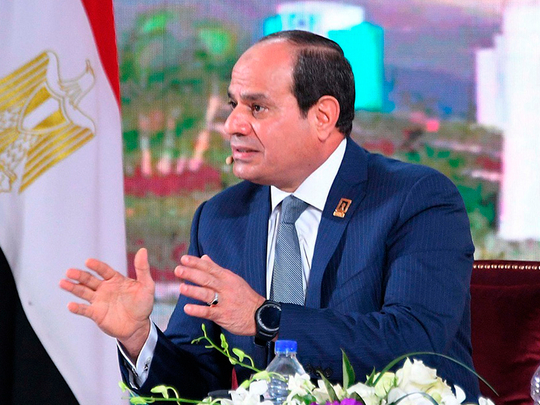
Dubai: Egyptian President Abdul Fattah Al Sissi called on young couples, to have a gap of 3 to 4 years between every child.
One or two children is more than enough in our times, Al Sissi said at a session of 'Ask the president' during the 6th edition of National Youth Conference at Cairo University.
Al Sissi government have started a family planning campaign called “Two are Enough”, beginning in June as population in Egypt has hit 100 million.
The campaign calls on couples to limit themselves to having two children.
Al Sissi last year in the same conference said: “The two biggest dangers that Egypt faces are terrorism and population growth, and this challenge decreases Egypt’s chances of moving forward.”
This year, he explained, the campaign doesn’t aim at banning Egyptians from having children, but in controlling the high birth rate, stating that the government “did not favour" imposing laws that limit the number of family members, or impose fines on big families. And for sure we don’t want to deprive people from certain privileges.”
Subsidy
Explaining the economic burden, he said: “Baby formula, which cost the government 46 pounds, and sells it out for 5 pounds, a price that is less than 10% of the actual cost.
An Egyptian buys 6 boxes or more a month, so if we raise the price to half, meaning 25 pounds so each family will have an extra expense of 150 pounds a month. But we are not doing that.”
Egypt minimum wage is one of the lowest in the world at 1200 Egyptian pound ($67) for the public sector only, and the private sector has no regulation. While Egypt unemployment rate is at 10.6% for the first quarter of 2018 according to government figures.
The government's call for fewer babies comes amid sharp increase in the price of food and transportation, and the IMF calling on government to cut subsidies.
The campaign depends mostly on media spreading awareness and encouraging fewer births, and on state-owned clinics to increase the supply of contraceptives while holding more awareness lectures in rural areas.
Takaful services
Targeting around 1.15 million women enrolled in the Social Ministry's Takaful program.
The first phase will be implemented in the 10 governorates most in need of family planning services and will later spread to other governorates in coming years.
The government will also try to change the prevailing ideas in the society through TV talk shows and series.
The idea of "every child comes with his own wealth”, competition between sisters-in-law over who has the most children, and concerns that if they do not give birth to a son, husbands may take another wife.
Also in villages, the believe of more children offer financial support at old age, as many has no retirement plans or pension funds to depend on.
The U.S. Agency for International Development will provide Egypt with $19 million over the next five years for contraceptives and to improve women’s health. While the UN population fund allocated about $6 million this year for reproductive health services in Egypt.












